|
|
|
Sort Order |
|
|
|
Items / Page
|
|
|
|
|
|
|
| Srl | Item |
| 1 |
ID:
112948
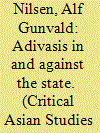

|
|
|
|
|
| Publication |
2012.
|
| Summary/Abstract |
The question of the state has come to occupy a central place in recent debates on subaltern politics in contemporary India. Against those critical voices that have claimed that the emancipation of subaltern groups can only proceed by challenging and moving beyond the modern Indian state, a range of scholars and commentators have asserted that it is precisely by seeking to harness the state that social movements can hope to advance their oppositional projects. Intervening in this debate, this article argues that although these new perspectives constitute a decisive advance in terms of developing a relational understanding of subaltern politics in India, questions pertaining to the structural constraints that social movements face in advancing their oppositional projects through the institutions and discourses of the state are still neglected. The article addresses these questions through a detailed exploration of the ways in and extent to which Adivasi movements have managed to democratize local state-society relationships in western Madhya Pradesh, and discusses the conceptual and political lessons that can be drawn from these experiences. Drawing on recent advances in Marxian state theory, the article argues that it is necessary to move beyond the theoretical impasses of both anti-statism and state-centrism and toward a politically enabling engagement with contemporary Adivasi mobilization in India.
|
|
|
|
|
|
|
|
|
|
|
|
|
|
|
|
| 2 |
ID:
112947
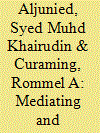

|
|
|
|
|
| Publication |
2012.
|
| Summary/Abstract |
Considered by many as the founding moment of Muslim separatism in Mindanao, the Jabidah massacre, which took place on Corregidor Island, involved the killing of Muslim trainees who were being prepared by the Philippine military in 1967 and 1968 to infiltrate and sabotage neighboring Sabah. This article analyzes the ways by which memories of this iconic event have in the past four decades been recorded, remembered, mythicized, appropriated, or simply consumed for their own purposes by political elites, civil society actors, and ordinary people in the Philippines. Our angle of vision is directed toward what we term "contentious vectors" -news media, novels, films, and blogs-to analyze the processes by which memories are recast. The ways by which the Jabidah massacre is remembered and appropriated reflect the contestations between civil society and the government in the Philippines, as well as the intense rivalry among the political elites both within and between the Christian-elite-dominated Filipino polity and Muslim communities. The struggle to influence the shape of memories of Jabidah is part and parcel of an ongoing struggle to create competing nations-of-intent amidst the persistent tensions between the state and its dissenters.
|
|
|
|
|
|
|
|
|
|
|
|
|
|
|
|
| 3 |
ID:
112945
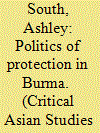

|
|
|
|
|
| Publication |
2012.
|
| Summary/Abstract |
This article explores how people living in areas of Burma/Myanmar affected by armed conflict (Karen populations in the southeast) and natural disaster (Cyclone Nargis in the Irrawaddy Delta) understand "protection" and act to minimize risks and protect themselves, their families, and communities. What do vulnerable people seek to protect, and how do they view the roles of other stakeholders, including the state, non-state actors (armed and political groups), community-based organizations, and national and international aid agencies? Are these viewed as protection actors, or sources of threat-or a mixture of both?
|
|
|
|
|
|
|
|
|
|
|
|
|
|
|
|
| 4 |
ID:
112950
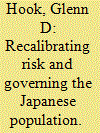

|
|
|
|
|
| Publication |
2012.
|
| Summary/Abstract |
This article examines how the Japanese state recalibrates the risks Japanese nationals face when traveling outside of Japan's sovereign territorial boundaries. The author elucidates the measures the state takes to assist its nationals deal with the range of risks they are likely to encounter when traveling to another sovereign state or territory. The article focuses on how the Ministry of Foreign Affairs communicates travel advice and warnings on "risky" destinations and how the state's recalibration of risk aims to inculcate "self-responsibility" as a norm in governing the Japanese population.
|
|
|
|
|
|
|
|
|
|
|
|
|
|
|
|
| 5 |
ID:
112949


|
|
|
|
|
| Publication |
2012.
|
| Summary/Abstract |
As part of a massive rural-to-urban migrant population in post-Mao reform era China, rural male migrants in their early twenties are increasingly entering the sex industry, which offers same-sex sexual services to other men. These young men, known as "money boys," form a new urban subject. From continuous ethnographic research on the male sex industry in China since 2004, the author argues that this new urban subject represents the site of multiple contradictions in China's continual transformations, which are at once authoritarian and neoliberal. The neoliberal reconfiguration, such as development strategies, commercialization of bodies, and liberalization of identities, opens up new social and sexual spaces and nurtures in thema new enterprising and desiring ethics of the self. However, their pursuit of needs, wants, and desires for work, love, and sex remains constricted by authoritarian codes such as the hukou system, antiprostitution measures, and the stratified cosmopolitan tongzhi community. Money boys are new urban subjects, but city outcasts; they are new labor subjects, but illegal dagongzai; they are new queer subjects, but "improper" tongzhi. Using the narratives of three money boys, the author argues that they, though endorsing neoliberal "ways of doing things" to create viable spaces for survival, do not embrace neoliberal political projects that tend to reinforce the hierarchical structure of urban-rural divisions, legal/illegal labor relationships, and illicit/licit desires. This article contributes to studies of migration, prostitution, and homosexuality in China, as well as to an understanding of the relationship between capitalism, state governance, and subjectivity in post-socialist China.
|
|
|
|
|
|
|
|
|
|
|
|
|
|
|
|
| 6 |
ID:
112946
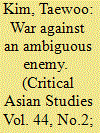

|
|
|
|
|
| Publication |
2012.
|
| Summary/Abstract |
In the early months of the Korean War, close air support provided by the U.S. Air Force (USAF) fighter-bombers in the front-line areas significantly delayed the advance of the North Korean Army. This article shows, however, that U.S. pilots very quickly diverged from the original policy of precision bombing and began the indiscriminate and unrestricted bombing of villages, towns, and even refugees in the South Korean region. They did so for three reasons: (1) to deal with effective countermeasures being taken by the North Korean Army; (2) the short range of U.S. fighter-bombers taking off from bases in Japan; and (3) difficulties in finding clear targets. Civilian areas were not exempt because most USAF pilots regarded the people in civilian areas as enemy troops and villages were considered to be enemy shelters. In the early months of the Korean War, the Operations Analysis Office (OAO) of the USAF had already acknowledged that "in a certain number of cases the troops in question may have been civilians." This article draws on mission reports written by U.S. pilots and on OAO reports to make the case that the conduct of American fighter-bomber pilots during the Korean War needs serious reconsideration.
|
|
|
|
|
|
|
|
|
|
|
|
|
|
|
|
|
|
|
|
|